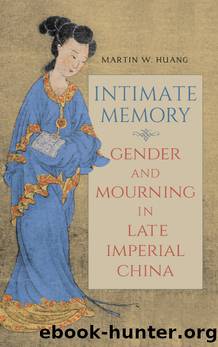Intimate Memory by Huang Martin W

Author:Huang, Martin W.
Language: eng
Format: epub
Publisher: State University of New York Press
Published: 2018-08-14T16:00:00+00:00
SELF-VINDICATION AND A NEW AESTHETIC OF CONCUBINAGE
Li Yuâs contemporary Mao Xiang, much more serious about his memories of his deceased concubine, was in many ways more innovative and more elaborate in writing about her. After his concubine, Dong Xiaowan, a former courtesan, died at the age of twenty-seven, Mao Xiang first wrote a long eulogy in verse titled âWangji Dong Xiaowan aiciâ 亡姬è£å°å®åè¾ (In Mourning of My Deceased Concubine Dong Xiaowan) to commemorate her, in which he explicitly argued that he married Dong Xiaowan, the former courtesan, for her virtue rather than her sexual appeal, and he was definitely not a lecherous man, or in his own pleading words, âThe reader of this eulogy should know that Mr. Dengtu is not a lecherous manâ (shi zhi du chi zhe, dang zhi Dengtu zi fei haose zhe ye ä¸ä¹è®æ¤è ï¼ç¶ç¥ç»å¾åé好è²è ä¹.20 Made famous in âDengtu zi haose fuâ ç»å¾å好è²è³¦ (Rhapsody on Mr. Dengtuâs Lecherousness), attributed to the writer Song Yu å®ç (ca. 229âca. 222 BC), the figure of Mr. Dengtu had become almost synonymous with a lecher in classical literature. In this rhapsody, to defend himself against the accusation made by Mr. Dengtu that he was a lecherous man, who might seduce the palace ladies of the King of the Chu, Song Yu questioned Mr. Dengtuâs own moral character by saying that the latter had five children with his wife despite her utter ugliness.21 However, Mao Xiang seems to have argued against the grain by implying that despite the traditional association of Mr. Dengtu with lecherousness (a figure Li Yu had readily compared himself to in the previously discussed biography for his love for young and pretty women when he was offered his future concubine Fusheng),22 he was actually a man of moral integrity. The reader is invited to question Song Yuâs somewhat farfetched moral logic that Mr. Dengtu was a lecherous man because his sexual desire was so strong that he slept with his wife despite her ugliness (they had five children together). On the contrary, Mr. Dengtu was not lecherous precisely because he properly fulfilled his role as a husband despite his wife being so unattractive. By the same token, marrying a famous courtesan, such as Dong Xiaowan, an act that had caused people to compare him to Mr. Dengtu, by no means indicated that Mao Xiang was a lecherous man because he married her for her virtue rather than her sexual appeal, just as Mr. Dengtu still loved his wife even though she was quite ugly. Mao Xiang seems to suggest that he was misunderstood as âlecherous,â just as Mr. Dengtu had been for almost two thousand years; thus, there was a more urgent need for self-vindication in an even lengthier memoir, this time in the form of prose, which should afford him much more space to make his case.
Mao Xiang starts his long memoir with an important disclaimer: at the age of forty, this grieving husband would never imitate those dissipated youths to write an amorous tale to harm the reputation of his deceased concubine, who happened to be a former courtesan.
Download
This site does not store any files on its server. We only index and link to content provided by other sites. Please contact the content providers to delete copyright contents if any and email us, we'll remove relevant links or contents immediately.
Professional Troublemaker by Luvvie Ajayi Jones(29644)
Whiskey Words & a Shovel I by r.h. Sin(19379)
Rewire Your Anxious Brain by Catherine M. Pittman(18630)
Healthy Aging For Dummies by Brent Agin & Sharon Perkins RN(17032)
Cat's cradle by Kurt Vonnegut(15320)
Talking to Strangers by Malcolm Gladwell(13338)
The Art of Thinking Clearly by Rolf Dobelli(10405)
They Both Die at the End by Adam Silvera(9797)
The 5 Love Languages: The Secret to Love That Lasts by Gary Chapman(9768)
Doing It: Let's Talk About Sex... by Hannah Witton(9272)
The Compound Effect by Darren Hardy(8918)
Thirteen Reasons Why by Jay Asher(8878)
Goodbye, Things by Fumio Sasaki(8571)
Wonder by R.J. Palacio(8561)
Tools of Titans by Timothy Ferriss(8357)
Atomic Habits: Tiny Changes, Remarkable Results by James Clear(8315)
Becoming Supernatural by Dr. Joe Dispenza(8194)
Wonder by R. J. Palacio(8095)
Change Your Questions, Change Your Life by Marilee Adams(7728)
